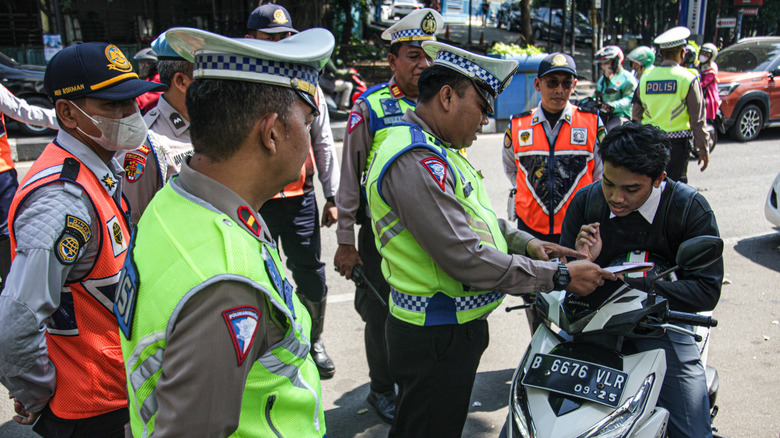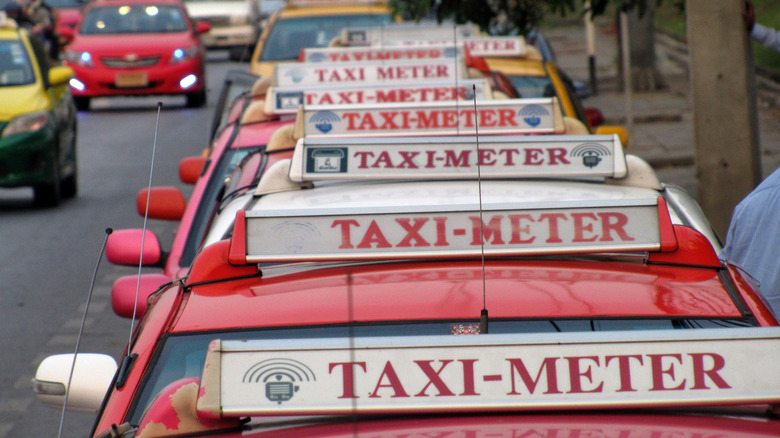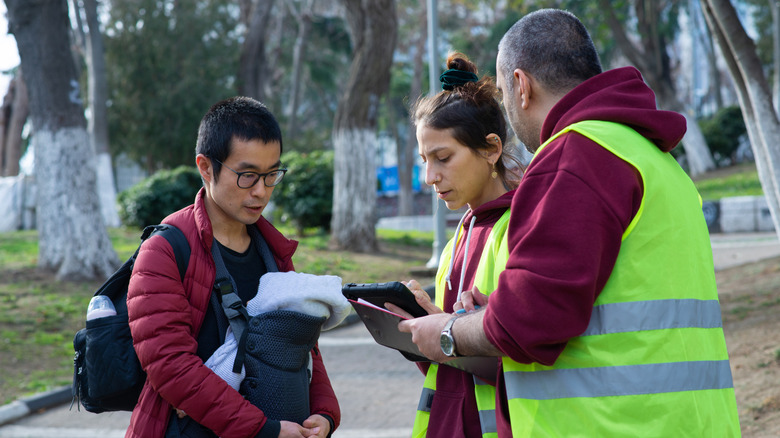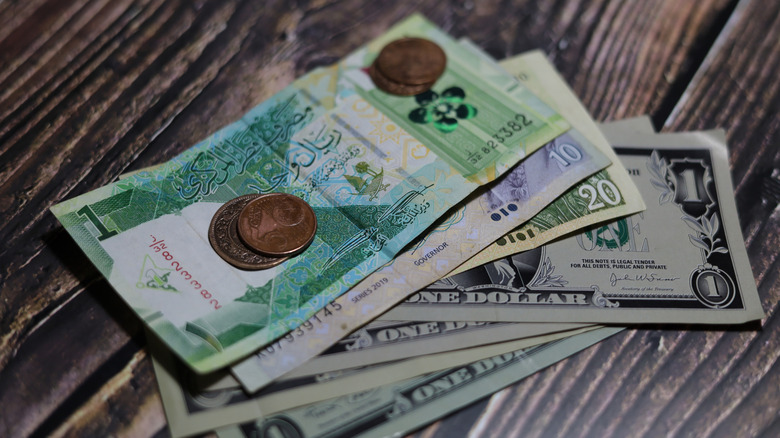The Most Common Travel Scams To Be Aware Of Before Your Vacation
Being on vacation is hard to beat. You could spend your trip visiting underrated Brazilian towns, exploring the beautiful beautiful Polynesian islands, or venture to another corner of the world of your choosing. Getting away allows you to see new things, immerse yourself in novel experiences, and finally take a breather and relax. It's a time when you can embrace life and let your guard down, which is both good and bad. When on vacation, things that might seem intuitive back home take a little longer to process, and require stepping into the unknown.
Understanding the norms and interactions of the culture in a place that's not familiar takes some time, and if it's a destination where you don't speak the language, it can take even longer. That's when you can become vulnerable, when you aren't able to read signals and cues, and when crooks can take advantage of you. Scams are a part of everyday life, and travel is no different. But some scams are particularly targeted at tourists. Here are some of the most common travel scams to look out for.
Having something spilled on you
You might be walking down the street, or eating something in a cafe, when something "accidentally" lands on you. It could be dirt, it could be mucky water from above, it could be some sauce or dressing. Whatever it is, it will make an unsightly mess, and suddenly you'll be the center of attention. Somebody will come to you and ask if you need help cleaning up, whether you need some tissues, or some clean water to get rid of the stain. How nice, you might think, that a total stranger is willing to offer you assistance — but don't be so quickly fooled.
In the chaos of the incident, your reaction, and cleaning up the mess, what you haven't noticed is that someone has stolen your bag that was hanging on the seat, or that you put on the ground while you tended to the mess. It's only then, when it's far too late, that you realize the whole production was carefully planned, with a predetermined cause and effect. If you find something similar happening to you, then politely refuse all offers of help. If your would-be rescuers remain annoyingly persistent, remove yourself from the situation completely.
Being stopped by fake police
There are a few variations of this scam, but essentially you'll find yourself cornered by someone, or maybe a couple of people, claiming to be the police. The exchange often starts when a stranger strikes up a conversation with you, perhaps pretending to be a tourist or helpful local. Before you know it, a police officer approaches you and demands to see your identification, or check your bags. You can ask what you've done wrong, and they might say that it's standard procedure, or that you've broken some arcane law.
The trouble is that these people aren't real police, and once you've handed over your passport, or your bag, they might just run off with it. Or they might demand payment to return the items now in their possession. This can happen in the street, near a transport terminal like a bus station, airport, or boat jetty, or even right by a tourist hotspot. The "police" might be dressed like real police, complete with a shiny badge, or claim to be undercover. Either way, never hand over anything in the street. You can ask for an official marked squad car to take you to the station, or you can ask the officers to get in touch with the U.S. embassy and take the matter from there. This is usually enough to put them off.
Using a dummy website
Phishing scams are now, sadly, a part of daily life. Cyber criminals are becoming increasingly sophisticated, and can set up fake travel websites that look like the real thing. They might claim to offer you the deal of a lifetime to a place that you've always wanted to go, or sell you business class seats for a steal — something you might not be able to resist if you are taking some of the longest flights in the world.
Be smart and never click on a link in the email to proceed to a booking page, or keep scrolling through a website that just doesn't seem right. Study the website's URL carefully, see if the company has a phone number through which you can contact it, or a physical address. IATA (International Air Transport Association) is a good resource to check a website's legitimacy; it's a body that administers a seal of approval to travel agents so that they can sell airline tickets. Check whether the website belongs to a company that has an IATA code, and then you can confirm the validity of the code on the IATA site.
Riding a taxi with a broken meter
With the advent of ride-sharing apps, the days of getting into a taxi and paying a fare based on the meter might be on the decline. But taxis are still a way a life in cities like New York. Indeed, New York is a city with a chaotic subway system, and yellow cabs are still widely popular. When you get in the cab, however, it's important to note whether it has a working meter.
If you're not careful, you might encounter a situation where you enter the vehicle, and the driver will start to drive, but won't start the meter because it's apparently broken. At the end of the journey, with no obvious way to know how much the journey should cost, you will be wickedly overcharged.
A variation of this is that you and the driver will agree on a price for the trip at the outset, only for the driver to inflate the amount once you reach the destination. In the first scenario, you should demand the meter be put on as soon as you get in the taxi, and if the driver refuses, get out of the taxi. In the second example, stick to your guns, and insist on only paying the agreed amount.
Learning that an attraction is closed
At the airport, or when you arrive in a city by bus or train, you might encounter a guide or taxi driver. They'll typically ask where you are going, or what you want to see, and perhaps you'll tell them the name of the hotel where you are staying, or one of the once-in-a-lifetime destinations you don't want to miss. The local might quickly report that your attraction is closed, but they can, conveniently, steer you toward an alternative. If you agree, you might find that they take you somewhere else where they get a commission, or worse, a quiet place where you may get robbed.
But think carefully: Would a popular tourist site suddenly shutter with no warning? These questions should be enough to quiet your mind and convince you that the guide or driver might be playing fast and loose with the truth. Try to look up the information yourself online, if you can. If you tell the driver or guide that you want to go to your intended destination anyway, and that might be enough to throw them off your scent. Alternatively, find another person who is willing to take you where you want to go without spinning a tall tale.
Receiving a free bracelet or amulet
Someone might approach you on the street, or while you're sitting at a cafe, and offer you a bracelet, which you accept because you think it's free. Alas, the gift isn't free, and the person will demand payment for it almost immediately after you accept it. Or they might claim it's free and then hit you with a tale of how they are down on their luck, struggling to make ends meet, and ask if you can help them in any way. In both scenarios, you need to resist.
The easiest way to avoid this is to not accept the "gift" in the first place, though that can be easier said than done. If you've already taken it, or they've already forced it on you, then immediately take it off and hand it back. If they refuse that return, then drop it on the street and walk away. This might lead to some harassment, and demands for payment, but just keep walking and ignore the harassers. Don't look at them, try to make an apology or counter argument, or engage with them at all. Once they realize you're not falling for it, they'll likely give up. And later you'll realize that a total stranger giving you something for free just doesn't happen.
Getting a group photo taken
While selfie sticks are great for taking group photos, they are banned in some places, like at Walt Disney World Resort. So how to take a photo of you and your family/friends/colleagues that gets everyone, and the background, in the frame? Luckily, a helpful passerby sees you struggling with that conundrum and offers to take the photo. Unfortunately, after tapping the phone a few times, or clicking the shutter-release button on your camera, they decide to demand payment to return the item, or simply run off with it.
Don't let this happen. Learn to live without everyone being in the photo, try taking a timer delayed photo (and watch your phone or camera carefully), or choose the stranger that you want to take the photo. A fellow tourist, maybe one already taking photos, is often a smart choice.
Incurring damage on your rental vehicle
When returning a car or scooter, a rental company might claim extensive damage, and charge you hundreds of dollars for minor scuffs. In many cases, the scuffs were already there before you picked up the vehicle, and so you shouldn't be liable for the damage. The key to ensuring this doesn't happen is having proof. Take a video of the vehicle, showing all sides, at the time of pickup, and then again when it's dropped off.
Rental companies usually take cash or a credit card hold as deposit while the vehicle is being rented. If they ask for anything else, like a passport, refuse to hand it over. If after all that, and with your evidence that you didn't cause any damage, they still try to rob you blind, call the police, or at least threaten to.
Being asked to sign a petition
It's a common sight in cities all over the world. An earnest young adult, holding a clipboard, comes up to you and asks you to sign a petition to help starving children, or threatened wildlife, or to address the climate crisis. Some of these petitioners are legitimate, wearing vests showing who they represent, and carrying identification that backs up their pitch. But others are less scrupulous, and are actually acting as a distraction.
This is what's really going on: When you stop to listen to their spiel, and perhaps decide that their cause is worthy of your attention, their accomplice is walking by to pickpocket you. Alternatively, they might ask you for money there and then, and given how needy their cause is, how can you resist? The simple way to avoid this upsetting petition scam is to not engage with the interloper, or just promise to donate to the cause online.
Getting back the wrong change
U.S. dollar bills, which come in different values but are shaped and colored the same, can be easy to mistake for one another. Now imagine how long it takes to get familiar with a foreign currency, possibly one that doesn't have any recognizable letters or numbers on it, and the level of confusion can go through the roof. This might lead you to not knowing what combination of bills and coins to use for payment — you might have to rely on the goodwill of a shopkeeper or local — and just as importantly, having difficulty computing whether you received the right amount of change in return.
This is a common scam inflicted on trusting, clueless tourists who are largely ignorant about the local currency. If the store owner short-changed you by 20, what are the chances you'd even know? They might also claim that you paid with a lower-value bill than you actually did. Vigilance, and a little homework understanding the currency, is the only solution.
Receiving unsolicited help
It's a common refrain heard from travelers after they return home: "Ah, the people there, they are so warm and welcoming." That might be true, whatever the destination, but if a stranger on the street offers to help you with directions, carry your heavy bags up the stairs of a subway station, or pledges to offer you tips on how to get that ATM machine to work, be very, very wary. They might seem friendly, but they could demand payment after "helping" you, or even disappear with your belongings.
When it comes to ATM machine scams, there's a good chance that the friendly local is in fact finding a way to access your funds, perhaps by knowing that the machine has a skimmer in it, which can copy all your card information. Only use ATM machines inside a bank branch, and always refuse any random help.
Being approached by child beggars
It's a heartbreaking sight to see children begging. While some kids that beg do so out of dire necessity, and have no other option but to fend for themselves in this manner, others are part of an elaborate con. They are put there to play with your emotions, tug at your heartstrings, and divert your attention from pickpockets that have their eye on much more than just a few pennies.
Sometimes the pickpockets are older accomplices, or they might even be children themselves, but ultimately they'll be looking to snag your wallet or money purse, rather than any change you're willing to part with. Sadly, visible poverty is a very real problem in many parts of the world. If you are intent on helping out the less fortunate, it's a safer idea to give to a charity in your destination.
Logging onto fraudulent WiFi networks
In public places with a high population density, locations like airports or hotels, free and fast WiFi can feel like salvation. These kinds of places are prime locations for criminals to create WiFi networks that you think are safe, but are merely fronts for stealing your information. You might be in a train station, for instance, and see that there is a network that requires no password, and whose name sounds just like the name of the train station.
But check the name again and you might notice that something is off, or you might notice a pop-up alert that says you actually need to pay for access to the web. That's the hint that hackers might be trying to access your sensitive information while you surf the Internet. In these cases, only use the official website of the location (if in doubt, ask an employee what it is), try routing through a VPN for extra protection, and never use the public WiFi to access anything that requires you using passwords, logins, or other critical data.
Waking up to an emergency call
You might get a call or email from someone close to you, saying that they have been robbed or put in prison, and need help, usually in the form of wiring money. You may also get an email from a person claiming to know your friend or family member, and that they are contacting you to help. The first thing to do, despite what the natural reaction might be, is to not panic. After all, there is a good chance that this isn't at all true. Secondly, piece together what the message said, and figure out whether there are any details that make the story seem likely, or is it all very vague and nonspecific?
Does the person on the phone actually sound like the person you know, or is the email from an address that you recognize and trust? One way to respond to the sender of the message is to ask them to contact the local U.S. Embassy, specifically a department known as the ACS (American Citizen Services). Another good way to weed out any bogus claims is to set up a code word with your loved one whenever you travel — something that only they would know.
Purchasing fake tickets for a train or bus
If Louis Vuitton bags and Rolex watches can be copied with amazing accuracy, scammers passing off fake tickets as real doesn't seem like such a big stretch. It is, in fact, a continuing problem, and unfortunately you'll end up being the one that loses out. The con can be simple, using digital technology to create QR codes that seem like real tickets, but are in fact useless.
These scams can also be elaborate, like a case in the United Kingdom where a man stole a train ticket machine and then used it to make fake tickets that looked completely legitimate. While it might seem obvious, you should only buy tickets from an official vendor in a train or bus station, either from a human being behind a ticket window, or from a vending machine in the station. This way, you'll know you are getting them directly from the official source.















